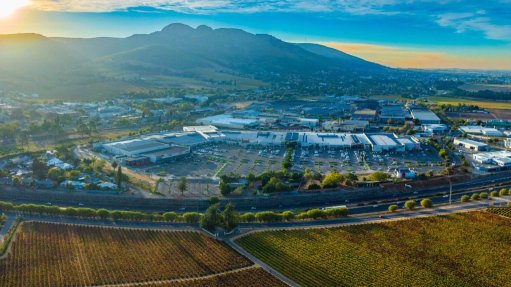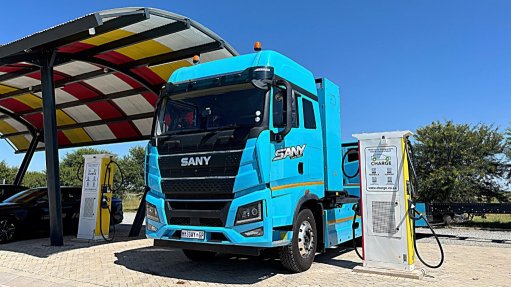World Health Organisation is transferring mRNA vaccine expertise to South Africa
The transfer of mRNA technology, through the World Health Organisation (WHO), to South African biotechnology company Afrigen, is strategically of the utmost importance, WHO mRNA Technology Transfer Programme Manager and Technology Programme leader Claudia Nannei told Engineering News on Thursday afternoon. (The WHO is a specialised agency of the United Nations, while mRNA is the abbreviation for messenger ribonucleic acid, which is essential for the production of proteins within living cells.)
Specifically, the transfer of the technology is to allow Afrigen to produce mRNA vaccines. Traditional vaccines use a harmless element from a disease-causing bacterium or virus, or a dead or weakened bacterium or virus, to trigger an immune response in a person’s (or animal’s) body. mRNA vaccines do not use any virus, weakened or dead, or any part of a virus, to trigger and immune response. Instead, mRNA vaccines contain a piece of mRNA which corresponds to a protein in the targeted virus (usually a protein in the outer membrane of the virus) and that triggers the body’s immune response. mRNA in vaccines does not enter the nucleus of a cell, nor do they alter the cell’s DNA.
What the WHO was doing was transferring expertise and knowledge, explained WHO Medicine Patent Pool Technology Transfer head Ike James to Engineering News. The WHO did not supply equipment. However, it is in the process of helping mobilise funding for all 15 of its mRNA vaccine manufacturing partners around the world, so that they can acquire the equipment they need for the research and development (R&D) and manufacture of such vaccines.
Nannei highlighted that the technology transfer to Afrigen was intended not only to benefit South Africa and Africa, but the entire world. The South African facility, located in Cape Town, was the tenth such facility involved in the WHO programme, worldwide. Like the other nine, Afrigen would undertake mRNA vaccine R&D, as well as manufacture. In fact, it would start with R&D and scale up to manufacture, once it had obtained all the necessary certifications for commercial-scale operations. The various facilities would exchange the knowledge they developed, with each other and with the WHO.
The original concept had been for the Afrigen facility to focus on Covid-19, but whether that was still necessary was under review. The other nine facilities involved in the WHO mRNA technology transfer programme were focused on diseases of concern in their regions, and it was probable that the South African facility would likewise focus on diseases that were of concern in its region – South Africa and Africa.
Article Enquiry
Email Article
Save Article
Feedback
To advertise email advertising@creamermedia.co.za or click here
Comments
Announcements
What's On
Subscribe to improve your user experience...
Option 1 (equivalent of R125 a month):
Receive a weekly copy of Creamer Media's Engineering News & Mining Weekly magazine
(print copy for those in South Africa and e-magazine for those outside of South Africa)
Receive daily email newsletters
Access to full search results
Access archive of magazine back copies
Access to Projects in Progress
Access to ONE Research Report of your choice in PDF format
Option 2 (equivalent of R375 a month):
All benefits from Option 1
PLUS
Access to Creamer Media's Research Channel Africa for ALL Research Reports, in PDF format, on various industrial and mining sectors
including Electricity; Water; Energy Transition; Hydrogen; Roads, Rail and Ports; Coal; Gold; Platinum; Battery Metals; etc.
Already a subscriber?
Forgotten your password?
Receive weekly copy of Creamer Media's Engineering News & Mining Weekly magazine (print copy for those in South Africa and e-magazine for those outside of South Africa)
➕
Recieve daily email newsletters
➕
Access to full search results
➕
Access archive of magazine back copies
➕
Access to Projects in Progress
➕
Access to ONE Research Report of your choice in PDF format
RESEARCH CHANNEL AFRICA
R4500 (equivalent of R375 a month)
SUBSCRIBEAll benefits from Option 1
➕
Access to Creamer Media's Research Channel Africa for ALL Research Reports on various industrial and mining sectors, in PDF format, including on:
Electricity
➕
Water
➕
Energy Transition
➕
Hydrogen
➕
Roads, Rail and Ports
➕
Coal
➕
Gold
➕
Platinum
➕
Battery Metals
➕
etc.
Receive all benefits from Option 1 or Option 2 delivered to numerous people at your company
➕
Multiple User names and Passwords for simultaneous log-ins
➕
Intranet integration access to all in your organisation


















